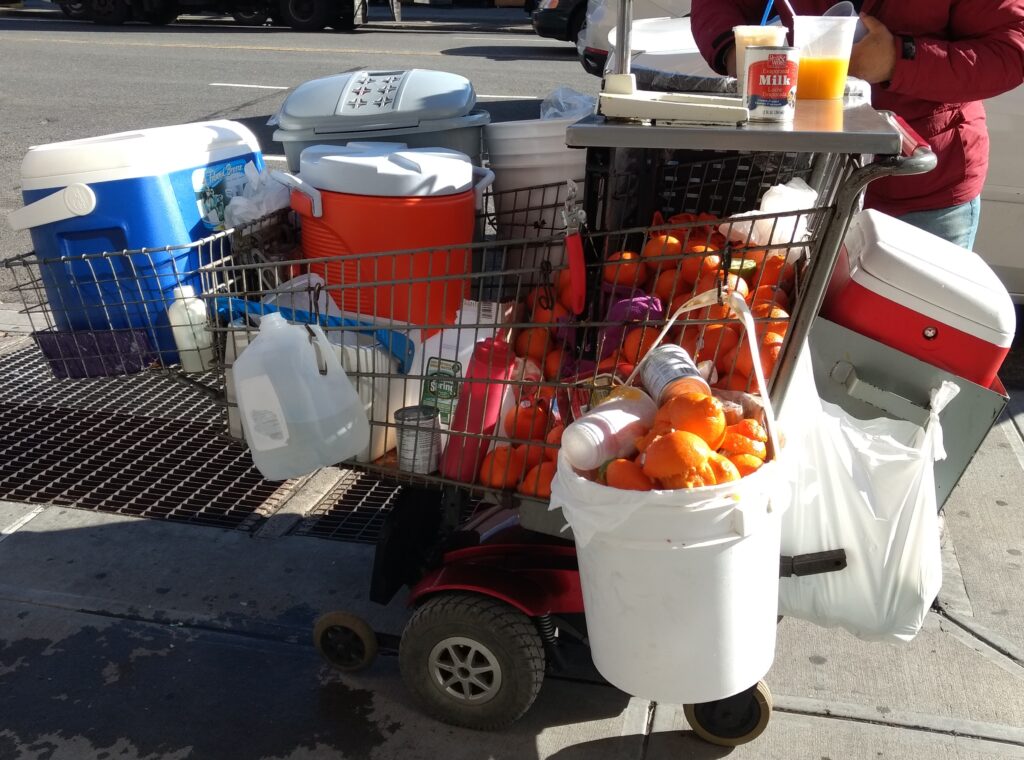
When I asked a Latin American street vendor in NYC if he has free time, he replied: “For what? This is my freedom, work is freedom. This is fun for me. Some people may pass by and think, ‘poor man selling churros in the street in such a cold weather’, but I do not feel like that, I feel good, I make money.”
Precarious work has increased globally in recent decades, influencing workers’ perceptions of their jobs. A defining feature of precarious work is the combination of bad working conditions with greater autonomy and flexibility. As a result, workers from various sectors, including freelance workers, platform workers, entrepreneurs, and street vendors highlight the benefits of working for themselves.
My research focuses on precarious street vendors’ contradictory experience of becoming their own bosses in New York City (NYC). I do not focus on determining if street vending is a choice or a last resort. Rather, I pay attention to how informal entrepreneurs explain their work as street vendors, despite its precarious conditions.
In my recently published article, I argue that street vendors develop an “entrepreneurial self” to make sense of becoming street vendors working under precarious conditions. The “entrepreneurial self” refers to an identity developed in opposition to standard employment. This identity aligns with entrepreneurial values such as self-reliance, freedom, and autonomy.
Unintendedly, precarious entrepreneurs’ discourses about their work align with neoliberal ideologies. Vendors praise relying on themselves, building their own business, and being their own bosses, even under precarious conditions.
In general, immigrants confront myriad obstacles to gaining formal sector employment in NYC, like language barriers, discrimination due to legal status, limited networks, enduring lengthy commutes, among others. Those who do manage to secure work often face punishing conditions, low wages, and discrimination. It is against this backdrop that street vendors elaborate a set of counter-narratives that contrast their small businesses to waged employment.
The ‘entrepreneurial self’ varies by gender. Men express that they value being their own bosses and having control over their time. As a male street vendor who previously worked in a bodega puts it: “it is better to be the head of a mouse than the tail of a lion.” Male vendors are proud of building their own business and taking on the role of a boss.
Women require flexibility during their working hours to take care of their families. A female street vendor in my study compares her job as a street vendor with her previous job at a retail store. She claims: “Here I like it because I like to be independent. While there, I could neither drink coffee nor speak on the phone. If there is an emergency, they do not allow you to talk. The manager comes and scolds you. You cannot even drink water.” As street vendors, women can bring their kids to work, stop working when they need to, or talk over the phone to check on their families.
These discourses also vary by age. Older people value being active as a mechanism to maintain themselves engaged and part of a community. As a 75-year-old street vendor puts it: “When you work as a street vendor you never get bored, you meet new people. I do it for my health, to be active, to work, otherwise, I’ll cripple. I don’t do it for the money. I do it for my health.”
Having said that, precarious street vendors’ work is affected by external factors such as the weather, police, health inspectors, costumers, and others. A male street vendor, who previously worked in a restaurant in NYC says: “I never go before my churros have all been sold out. It is not a business if I don’t finish selling it all. I don’t have a patron. I am my own boss.” Even if they do not have a boss and a fixed schedule, external factors “discipline” their economic activities and routines.
Unlike professionals or platform workers, immigrant street vendors cannot easily fit into a standard job with a fixed schedule. Street vendors struggle with the demands of regular jobs, like fixed schedules, long commutes, and relying on a check by the end of the month. The need to control their time and money is entangled with the economic hardships they face as immigrants.
The category of “informal work” is commonly used to describe a specific type of labor relationship in developing countries that exist outside the purview of the state. But informal dynamics also happen within developed economies. By understanding street vendors’ narratives and dynamics in a city like NYC, it is possible to compare how informality varies globally.
Finally, my study speaks to discourses promoting entrepreneurship as a means to achieve economic freedom and success. While private and public institutions celebrate entrepreneurship and develop economic incentives to encourage individuals to become entrepreneurs, these institutions simultaneously penalize certain types of entrepreneurship. Specifically, governments penalize immigrant street vending worldwide. This dichotomy illustrates the inconsistencies of the “entrepreneurial dream” and its intersection with race, gender, and citizenship.
Read more
Alejandra Cueto. “Work is freedom: The Entrepreneurial Self among Street Vendors” in The Sociological Quarterly 2024.
Image: Alejandra Cueto
Alejandra Cueto is a PhD Candidate in the Sociology Department at Brown University. She earned her M.A. in Sociology from Columbia University and her B.A. in Sociology from the Pontifical Catholic University of Peru.
